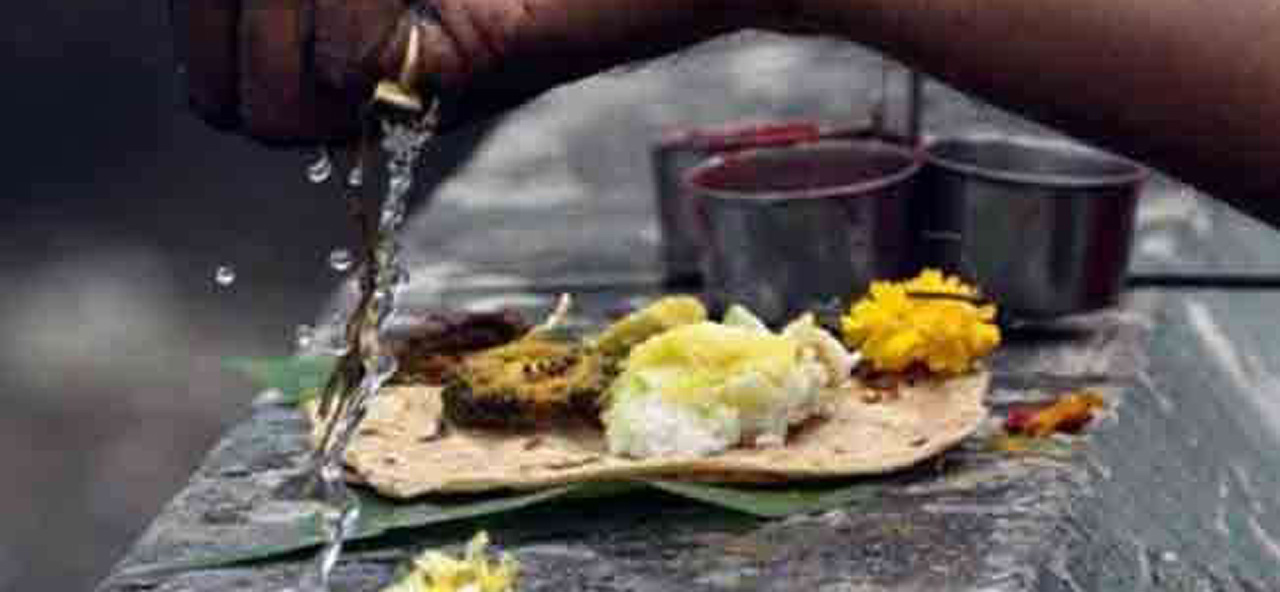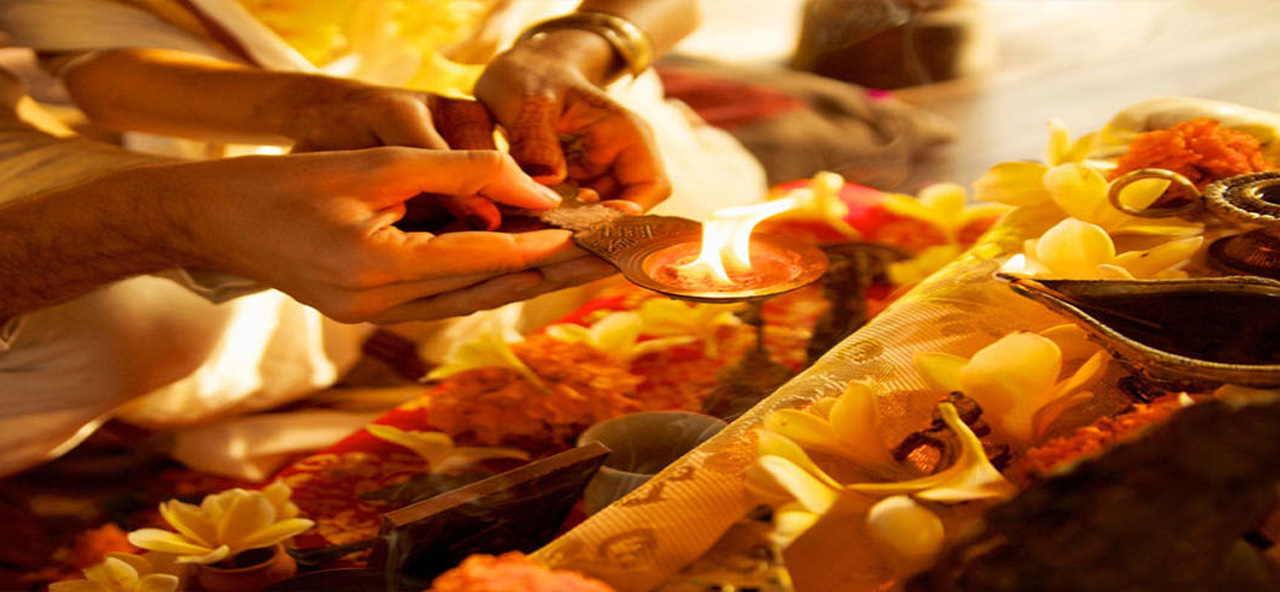Pitrudosh Nivaran Pooja
Pitrudosh Nivaran Pooja
Pitru Paksha
Narayan Nagbali / Tripindi Shraddha vidhi should performed to get rid of Pitru Dosh. Performing these poojas' during the period (5th to 19th September) of Pitrupaksha(पितृ पक्ष) will be more beneficial. According to the Hindu calendar Pitrupaksha starts immediately after the Ganesh festival and ends with the New moon day know as Sarvapitri amavasya. The Hindus offer homeage to their ancestors during pitrupaksha to get their blessings and help their soul attain the path of Heaven.

According to Hinduism, the souls of three preceding generations of one's ancestor reside in Pitru–loka, a realm between heaven and earth. This realm is governed by Yama, the god of death, who takes the soul of a dying man from earth to Pitru–loka. Hindus are expected to propitiate the ancestors(let the ancestors be in peace) in the first half, during the dark fortnight i.e Pitru Paksha and let the soul of their ancestors reach the Heaven from the Pitru-loka.
The performance of Shraddha by a son during Pitru Paksha is regarded as compulsory by Hindus, to ensure that the soul of the ancestor goes to heaven from the Pitru-loka.
Pitru Paksha (पितृ पक्ष) is a 16–lunar day period in Hindu calendar when Hindus pay homage to their ancestor (Pitrs), especially through food and shraddha pooja offerings. The period is also known as Pitru Pakshya, Pitri Pokkho, Sola Shraddha ("sixteen shraddhas"), Kanagat, Jitiya, Mahalaya Paksha and Apara paksha. Pitru Paksha is considered by Hindus to be inauspicious, given the death rite performed during the ceremony, known as Shraddha or tarpan. Pitru Paksha starts on the forthnight mmediately after the ganesh festival and end on the New Moon day know as Savra Pitra Amavasya.
The Legend
According to Hinduism, the souls of three preceding generations of one's ancestor reside in Pitru–loka, a realm between heaven and earth. This realm is governed by Yama, the god of death, who takes the soul of a dying man from earth to Pitru–loka. When a person of the next generation dies, the first generation shifts to heaven and unites with God, so Shraddha offerings are not given. Thus, only the three generations in Pitru–loka are given Shraddha rites, in which Yama plays a significant role. According to the sacred Hindu epics, at the beginning of Pitru Paksha, the sun enters the zodiac sign of Libra (Tula). Coinciding with this moment, it is believed that the spirits leave Pitru–loka and reside in their descendants' homes for a month until the sun enters the next zodiac—Scorpio (Vrichchhika)—and there is a full moon. Hindus are expected to propitiate the ancestors in the first half, during the dark fortnight.
When the legendary donor Karna died in the epic Mahabharata war, his soul transcended to heaven, where he was offered gold and jewels as food. However, Karna needed real food to eat and asked Indra, the lord of heaven, the reason for serving gold as food. Indra told Karna that he had donated gold all his life, but had never donated food to his ancestors in Shraddha. Karna said that since he was unaware of his ancestors, he never donated anything in their memory. To make amends, Karna was permitted to return to earth for a 15–day period, so that he could perform Shraddha and donate food and water in their memory. This period is now known as Pitru Paksha.
When the legendary donor Karna died in the epic Mahabharata war, his soul transcended to heaven, where he was offered gold and jewels as food. However, Karna needed real food to eat and asked Indra, the lord of heaven, the reason for serving gold as food. Indra told Karna that he had donated gold all his life, but had never donated food to his ancestors in Shraddha. Karna said that since he was unaware of his ancestors, he never donated anything in their memory. To make amends, Karna was permitted to return to earth for a 15–day period, so that he could perform Shraddha and donate food and water in their memory. This period is now known as Pitru Paksha.
Significance of Pitru Paksha
The performance of Shraddha by a son during Pitru Paksha is regarded as compulsory by Hindus, to ensure that the soul of the ancestor goes to heaven. In this context, the scripture Garuda Purana says, "there is no salvation for a man without a son". The scriptures preach that a householder should propitiate ancestors (Pitris), along with the gods (devas), ghosts (bhutas) and guests. The scripture Markandeya Purana says that if the ancestors are content with the shraddhas, they will bestow health, wealth, knowledge and longevity, and ultimately heaven and salvation (moksha) upon the performer.
The performance of Sarvapitri amavasya rites can also compensate a forgotten or neglected annual Shraddha ceremony, which should ideally coincide with the death anniversary of the deceased. Shraddha involves oblations to three preceding generations—by reciting their names—as well as to the mythical lineage ancestor (gotra). A person thus gets to know the names of six generations (three preceding generation, his own and two succeeding generations—his sons and grandsons) in his life, reaffirming lineage ties.
Pitru Paksha emphasises the fact that the ancestors and the current generation and their next unborn generation are connected by blood ties. The current generation repays their debt to the ancestors in the Pitru Paksha. This debt is considered of utmost importance along with a person's debt to his gurus and his parents.
The performance of Sarvapitri amavasya rites can also compensate a forgotten or neglected annual Shraddha ceremony, which should ideally coincide with the death anniversary of the deceased. Shraddha involves oblations to three preceding generations—by reciting their names—as well as to the mythical lineage ancestor (gotra). A person thus gets to know the names of six generations (three preceding generation, his own and two succeeding generations—his sons and grandsons) in his life, reaffirming lineage ties.
Pitru Paksha emphasises the fact that the ancestors and the current generation and their next unborn generation are connected by blood ties. The current generation repays their debt to the ancestors in the Pitru Paksha. This debt is considered of utmost importance along with a person's debt to his gurus and his parents.
Who and for Whom
It is essential that Shraddha be performed by the son—usually the eldest—or male relative of the paternal branch of the family, limited to the preceding three generations. However, on Sarvapitri amavasya or matamaha, the daughter's son can offer Shraddha for the maternal side of his family if a male heir is absent in his mother's family.
The Shraddha of the ancestors can be done for the preceeding 3 generations by performing Tripindi Shraddha. The Shraddha can also be done of all the know and unknown ancestors by performing Narayan Nagbali pooja.
The Shraddha of the ancestors can be done for the preceeding 3 generations by performing Tripindi Shraddha. The Shraddha can also be done of all the know and unknown ancestors by performing Narayan Nagbali pooja.
Rites of Shraddha
The male who performs the shraddha should take a purifying bath beforehand and is expected to wear a dhoti. He wears a ring of kush grass. Then the ancestors are invoked to reside in the ring. The shraddha is usually performed bare-chested, as the position of the sacred thread worn by him needs to be changed multiple times during the ceremony. The shraddha involves pinda-daan, which is an offering to the ancestors of pindas (cooked rice and barley flour balls mixed with ghee and black sesame seeds), accompanying the release of water from the hand. It is followed by the worship of Vishnu in form of the darbha grass, a gold image or Shaligram stone and Yama. The food offering is then made, cooked especially for the ceremony.
The offering is considered to be accepted if a crow arrives and devours the food; the bird is believed to be a messenger from Yama or the spirit of the ancestors. A cow and a dog are also fed, and Brahmin priests are also offered food. Once the ancestors (crow) and Brahmins have eaten, the family members can begin lunch.
The offering is considered to be accepted if a crow arrives and devours the food; the bird is believed to be a messenger from Yama or the spirit of the ancestors. A cow and a dog are also fed, and Brahmin priests are also offered food. Once the ancestors (crow) and Brahmins have eaten, the family members can begin lunch.
What is Pitru Dosh?
The ninth house in the natal chart is the house of fortunes or the house of father and manes. A conjugation of Sun and Rahu in this house forms the Pitru Dosha or Pitru Dosh, which is known to remove auspiciousness from the house. This Dosh is also formed if a family member dies unnatural death or if people do not offer their respects to the souls of their deceased loved ones.
Pitru Dosh may bring sorrows in the life of an individual in the form of money loss, household conflicts and inability to get a child or a job or professional difficulties. In Pitru Dosh, an individual gets delayed support of his luck and ends up with much struggle to achieve success on professional front. As per the Hindu scriptures, an individual should pay respects to his manes before the worship of his God, as they hold greater position.
Pitru Dosh may bring sorrows in the life of an individual in the form of money loss, household conflicts and inability to get a child or a job or professional difficulties. In Pitru Dosh, an individual gets delayed support of his luck and ends up with much struggle to achieve success on professional front. As per the Hindu scriptures, an individual should pay respects to his manes before the worship of his God, as they hold greater position.
Remedies / Pooja to get rid of Pitru Dosh?
Pitru Dosh nivaran is done by performing Narayan Nagbali or Tripindi Shraddha. The main remedy for Pitru Dosh is by performing Pinda Daan which is done through Narayan Nagbali pooja or Tripindi Shraddha.
Other Pitru Dosh nivaran 'upay' includes Pitru sukt pooja, which is done on 'Amavasya' (No Moon) and 'Chathurdashi' of every month.
Other Pitru Dosh nivaran 'upay' includes Pitru sukt pooja, which is done on 'Amavasya' (No Moon) and 'Chathurdashi' of every month.
Pooja for Pitru Dosh Nivaran
Blessings
The ancestors will bestow health, wealth, knowledge and longevity, and ultimately heaven and salvation (moksha) upon the performer.
Pitru Dosh Nivaran Mantra
ऊँ श्री सर्व पितृ दोष निवारणाय कलेशम् हं हं सुख शांतिम् देहि फट स्वाहा: |
Ohm Shree Sarva Pitra Dosh Nivarnaay Kaleshm Han Han Sukh Shantim Dehi Fat Svahaa:||





